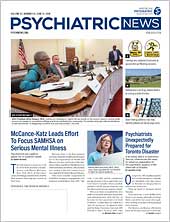More than 2 million times every year, an individual with a serious mental illness is arrested. And at any given time, more than half a million people with serious mental illness are in jail or prison.
In fact, 44 percent of jail inmates and 37 percent of state and federal prisoners have a history of a mental illness. “Those numbers are staggering no matter how you look at them,” said APA President Altha Stewart, M.D., at a congressional briefing titled “Innovations and Challenges in Providing Mental Health Services to People in Prison and Those Reentering the Community.” APA was one of the sponsors of last month’s briefing on Capitol Hill.
Driving this crisis are the higher rates of arrest of people with mental illness for petty crimes directly related to their disorder, such as public nuisance, public urination, drunkenness, and behavior perceived by others as dangerous, said Stewart, who is also a professor of psychiatry and director of the Center for Health in Justice-Involved Youth at the University of Tennessee Health Science Center. Longer stays for people with mental illness, coupled with low utilization of evidence-based treatments during incarceration, compounds the problem. The costs, too, are staggering: the total expenditure on prisons is nearly $43 billion a year, and states are spending an average of $33,000 per inmate a year.
Psychiatrists are the most highly trained, highly skilled physicians to manage the treatment of incarcerated individuals with serious mental disorders, yet they are underrepresented in correctional settings—typically, there is just one provider for every 150 inmates, Stewart said.
To help break the cycle of recidivism and encourage successful reentry into the community, Stewart urged support for HR 4005, a bipartisan bill introduced by Rep. Paul Tonko (D-N.Y.) that would allow the use of federal Medicaid funds for health care services for incarcerated individuals during the 30-day period preceding their release. Securing an individual’s Medicaid coverage prior to his or her release would give individuals “a leg up and reduce their risk of relapse of mental health conditions or overdose, while also lowering their risk of recidivism back into the criminal justice system,” Stewart said.
Robert Morgan, Ph.D., chair of the Department of Psychological Sciences at Texas State University, said prisons have become de facto mental hospitals, with people with mental illness three times more likely to be incarcerated than hospitalized. But current treatment models that focus solely on symptom reduction for inmates with mental illness just aren’t working to help these individuals, he added.
“We need to target the issues that are putting these people at risk for future contact with the criminal justice system,” Morgan said. Research has zeroed in on several central “criminogenic risk factors” that lead to individuals becoming enmeshed in the criminal justice system, regardless of whether they have a mental disorder. These factors include substance abuse; antisocial thoughts, behavior, and personality traits; associations with other criminals; family or marital problems; and poor work or school performance.
Services that address the dual issues of mental illness and criminal risk together are no more expensive than traditional programs, yet they can result in a 30 percent to 50 percent reduction of recidivism, Morgan said. One such program piloted with 248 inmates in Texas resulted in a 50 percent lower re-arrest rate two years after their release from prison, compared with other offenders who did not receive the treatment, he said.
Denny Kaemingk, secretary of the South Dakota Department of Corrections, outlined some mental health best practices he said are used in South Dakota prisons. For starters, inmate mental health care starts with staff training. All are trained in both mental health first aid as well as dialectical behavior therapy, which helps with communication as well as de-escalation of inmate conflicts that arise, he said. On day one of an admission, all inmates complete a psychiatric questionnaire. Those who screen positive are sent for in-depth assessments and evaluations, and they are assigned a mental health–functioning code so that prison staff understand that individual’s level of need. The prison tries to prevent and limit segregation of inmates with mental illness whenever possible, because it can worsen long-term outcomes, he added. ■
The text of the Medicaid Reentry Act (HR 4005) can be accessed
here.

